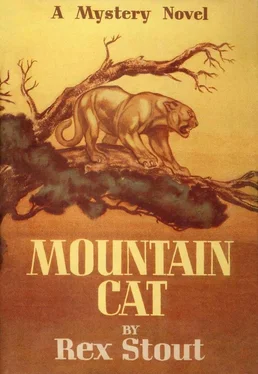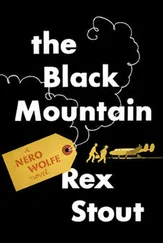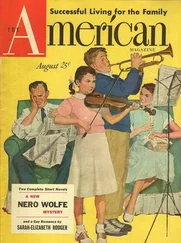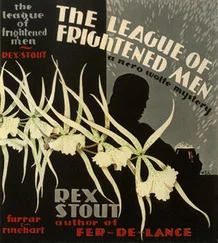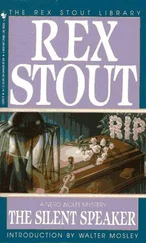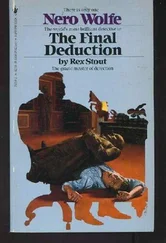“I’m going to bring in my witnesses.”
“You are not. You stay right here and tell it to the county attorney.”
“I can have—”
“You can have a chair, or a square foot to stand on, until he gets here.”
Tuttle leaned back and glared, first at his brother sheriff, then at the Reverend Rufus Toale and, finally, at the young lawyer in search of a client. In a long experience he had never seen so much ruckus about one bullet in one man, from so many different quarters; and besides the ruckus, there were the correlative perils personal to himself and his job, which constituted, from his standpoint, by no means the least important feature of the case. He was around sixty and he was kind of tired, and he hadn’t saved up much money. He was about deciding that he had better shoo the clergyman and the brother sheriff out of the room when the door opened to admit Ed Baker. He approached the desk, demanding, “Well, Bill, what is it?”
“This Dillon here again. Says he’s got evidence.”
Baker wheeled. “Oh, you. What kind of evidence?”
Ty Dillon faced him. “Evidence that will clear Delia Brand.”
“Where’s her attorney?”
“I don’t know and I don’t care. I’m taking it for granted that you have no ill will for Delia Brand and if you are given facts that create a strong presumption of her innocence, you’ll turn her loose. I know you didn’t believe Pellett’s story about her bag, but you only had his word for it and he’s her uncle. This is different. It’s evidence.”
“What is it?”
“Get a stenographer.”
“Go on and tell me.”
“Just as you say, I won’t forget it. I’ve got witnesses, but I’ll sketch it first. As you know, Delia bought a box of cartridges at MacGregor’s Tuesday morning. The clerk who sold them to her took the gun she had and looked at it and it wasn’t loaded; he said so in the interview he gave the Times-Star . Tuesday afternoon at the Pendleton School Delia left her handbag with her hat on a shelf in the cloakroom which is partitioned off from Room Nine. Two boys sneaked into the cloakroom and, while she was teaching the class, they stole the box of cartridges from her bag. That’s all they took. They saw the gun there. They took the cartridges home with them and I’ve got them. Right here in my pocket. Fifty of them. All of them. Then where did she get a cartridge to shoot Jackson with? And the ones in the gun?”
Baker, eyeing him, grunted. “Somebody got a cartridge to shoot Jackson with.”
“She didn’t. Where?”
“Who says the cartridges you’ve got are the ones she bought?”
“Don’t worry about that. That’s sewed up. The boys are in the anteroom.”
“She hasn’t said anything about the cartridges being stolen. She says bag and all were stolen.”
“That was later, from her car. She hadn’t missed the cartridges. This thing is watertight. It’s so tight that I didn’t even have her sister see her before I came to you, to warn her not to say that she noticed the cartridges in her bag after she left the school. She couldn’t say that, because they weren’t there. This is open and shut.”
The county attorney, still eyeing him, chewed at his lip. Finally he turned to the sheriff. “Get the boys in here, Bill.”
In response to the sheriff’s message, the population of the office was increased not by two, but by four. In front was Clara, her face a weary composite of hope and anxiety; next came Jimmie and Eric; in the rear was James Archer, Senior, carrying his coat over his arm. The young man from the anteroom stayed to help get chairs collected and occupied and then withdrew.
Names were supplied by Dillon to the county attorney, who opened up on Jimmie. “Were you at the Pendleton School Tuesday afternoon?”
“Yes, sir.”
“What were you doing?”
“Doing my dooty.”
“What were you doing while Delia Brand was teaching her class?”
“I was finding something because somebody had offered a reward.”
“Oh, a reward? Did you get the reward?”
“Yes, sir.”
“Who gave it to you?”
“Mr. Escott. My lawyer.”
“I see. When he gave you the reward did he tell you what to say when you were brought here?”
“No, sir.”
“Did anybody tell you want to say?”
“Yes, sir.”
“What did they tell you to say?”
“The truth.”
Dillon put in savagely, “Oh, cut it out, Baker. That’s tommyrot. There’s any amount of corroboration — the fathers and mothers and the school principal—”
“I’ll handle it, thanks.” Baker went on with Jimmie: “What was it you found?”
“A box of catriches.”
“Where did you find it?”
“In Miss Brand’s bag. I was there in the cloakroom with Eric, and I whispered to him, I said...”
Jimmie was off. It took over an hour. Ed Baker, first with one boy and then the other, exhausted every detail of the entire episode from beginning to end, and then started over again and repeated the performance. He questioned James Archer, Senior, with equal thoroughness and then went after Jimmie once more, regarding his visit to the offices of Escott, Brody & Dillon and his surrender to the bait of the silver dollars. He was working on that, and Dillon was pacing up and down in impatience, when he was interrupted by the sheriff, who had been speaking briefly on the phone.
“It’s Frank Phelan,” said the sheriff, covering the transmitter. “He says he’s got something and he’s bringing it over right away, and he wants you to be here.”
“Well, I’m here!” Baker told him testily. “Tell him to bring it along!” He resumed with Jimmie. Five minutes later he had all he seemed likely to get. The questions stopped. He surveyed the boy a moment, then turned to face Dillon. “All right,” he said grudgingly. “You said you have evidence. You have. Congratulations. But it seems to me you should have taken it to the defense attorney in the first place. You’d better take it there now.”
Dillon stared. “Take it — why? What more do you want? Do you mean you’ve got the nerve to hold—” His voice was on the way, crescendo, to a shriek of indignation.
“Cool off, Dillon. Use your head a little. What’s my nerve got to do with it? I admit you’ve dug up evidence, enough of it so that when Harvey Anson gets it he’ll probably take a crack at a habeas corpus writ and then I’ll have to decide whether to fight it or not. I’ve got to think it over. There’s still a preponderance against her and if you were in my place you’d know it as well as I do.”
“But damn you, what more do you want? This proves that she couldn’t—”
“This proves only one thing, that if she shot Jackson she didn’t do it with one of the cartridges she bought from MacGregor’s clerk Tuesday morning. I admit that’s something. I admit that it puts it up to me — now what?”
He wheeled. The door had been flung open and feet were tramping in. Everybody gazed at the new influx, which seemed to threaten, as it continued, to jam the office. First was Lem Sammis, followed by Quinby Pellett. Next in order, entered a uniformed policeman, a tall skinny young man in a polo shirt and seersucker slacks, with wavy blond hair, Chief of Police Phelan and another cop in uniform. At the tail end, as usual, progressing with a minimum of exertion, was Harvey Anson.
The Reverend Rufus Toale unobtrusively left his seat and went to stand by the wall. James Archer, Senior, chased the boys off of their chairs. But the newcomers appeared to be seeking not ease, but action. They stayed on their feet. Lem Sammis was saying to Ed Baker, “See how you like this one. So Quin Pellett’s a liar, huh? When you go out of my gate, Ed, it shuts behind you!” Phelan was telling the sheriff he had better get some of the crowd out of there. But Harvey Anson had elbowed through to the county attorney and his thin voice, sparing of breath, took the attention:
Читать дальше
